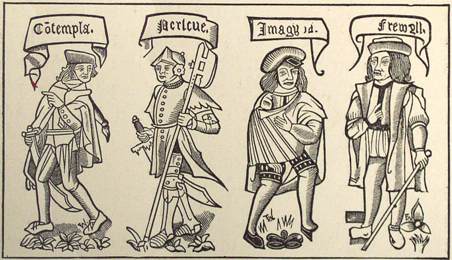The morality plays
The power of drama both to entertain and to educate must have been immediately evident from the popularity of the mystery plays.
It is not surprising that another kind of play developed side by side with the mystery plays, and that these dramatized the most instructive part of the church service, the homily or sermon.
One of the longest and best preserved morality plays is The Castle of Perseverance. Like most morality plays, it takes a central figure who represents all of us, and confronts him (he is always a male) with a situation which involves a moral decision. The central character in The Castle of Perseverance is Mankind* (another well-known morality play concerns Everyman).The staging of The Castle of Perseverance is discussed in the section of the site on the early stage.
Two situations often encountered in morality plays are of particular interest in an understanding of the structure of Shakespeare's plays: temptation* and debate.*
A modernized text of The Castle of Perseverance by David Parry and Alexandra F. Johnston is available on line. The text of Everyman is available on line.
Footnotes
-
Mankind/humankind
The original latin name of the protagonist is more generalized by gender than the English allows: it is Humanum Genus, or Humankind.
-
Temptation
The central character in the moralities often becomes a battleground between virtue and vice. In The Castle of Perseverance, the central character, Mankind, is followed through his life as he is subjected to various appropriate temptations: in his youth he is particularly susceptible to Lust-liking, Flesh and Pleasure; in age he falls victim to Covetous[ness].
In each case the vices tempt him with their attractive sins, while the corresponding virtues, led by a Good Angel, try to keep him (unsuccessfully) from giving in to temptation.
Temptation in Shakespeare
Central characters in many Shakespeare plays are subjected to temptation through external characters. Othello is tempted by Iago, Macbeth by Lady Macbeth, Brutus by Cassio; possibly even Hamlet is tempted by the Ghost. The tempters cannot be described by simple abstract words, but their function is similar to the tempter in the moralities.
-
Debate
In The Castle of Perseverance, when Mankind is dead, the four daughters of God debate what his fate should be--whether his soul should go to Heaven or Hell. The four characters are Mercy, Justice, Peace, and Truth. Justice and Truth point to Mankind's persistent sinfulness, and argue that his soul should go to Hell; Mercy and Peace argue that God's goodness is such that, despite his sinfulness, Mankind should be forgiven. Mercy and Peace prevail, and God allows the soul of Mankind to ascend.
Debate in Shakespeare
Debate is often a unifying force in Shakespeare's plays: for example, it is difficult for those in power to decide between the contradictory claims of mercy and justice when confronted with a specific, complex human situation, an issue central to such plays as The Merchant of Venice and Measure for Measure.
